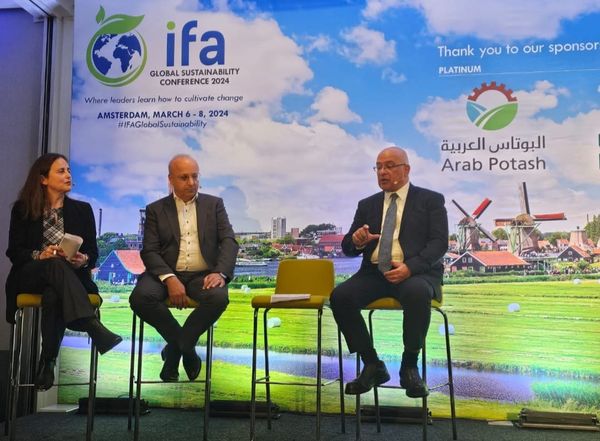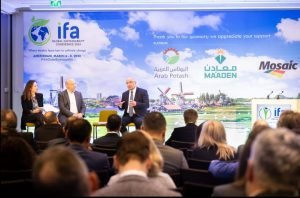
By : staff writer
Jordan Daily – Dr. Maen Nsour, CEO of Arab Potash Company and board member of the International Fertilizer Association (IFA), addressed the Global Sustainability Conference in Amsterdam this March, discussing the evolution of sustainability in the fertilizer industry.
In a statement seen by Jordan Daily , Nsour highlighted the industry’s increased focus on sustainability reports, which showcase companies’ performance and alignment with the sustainability goals of the countries they operate in. He also commended the IFA’s efforts in promoting sustainability principles, including the launch of the Green Leaf Award for excellence in safety, health, and environmental production of fertilizers, and the Sustainable Fertilizer Academy, an online platform focusing on sustainability.
In the face of a global shift towards sustainability, Nsour stressed the importance of trust and accountability in the fertilizer sector and the necessity of investing in research and development to accelerate the adoption of environmentally friendly practices.
He praised the partnership between the IFA and the International Energy Agency in developing a global roadmap for regulating ammonia technology, presented at the United Nations Climate Change Conference (COP 26) in Glasgow in 2021.

Nsour also discussed the role of governments in promoting a sustainable fertilizer industry through incentives, regulations, emission standards, financial support for research and development, and carbon pricing mechanisms , emphasizing the importance of granting incentives or tax breaks to companies investing in sustainable fertilizer technologies.
Parallel to government efforts, Nsour explained that the Licence to Operate (LTO) for mining operations or specific commodity production plays a pivotal role in enhancing sustainability in the fertilizer sector.
Looking ahead, Nsour predicted fundamental changes in the fertilizer industry, from the adoption of new carbon reduction technologies to enhanced public awareness of best agricultural practices , stressing the crucial role of carbon reduction technologies in achieving emission reduction goals, including the use of electric power, renewable energy, and sustainable green hydrogen.
Nsour concluded by emphasizing the importance of promoting a circular economy, encouraging the production of fertilizers from local, organic, or secondary raw materials, or by converting waste into crop nutrients. He affirmed that balancing food security and sustainability goals will be a major challenge for the fertilizer industry, requiring innovative solutions and international cooperation.

